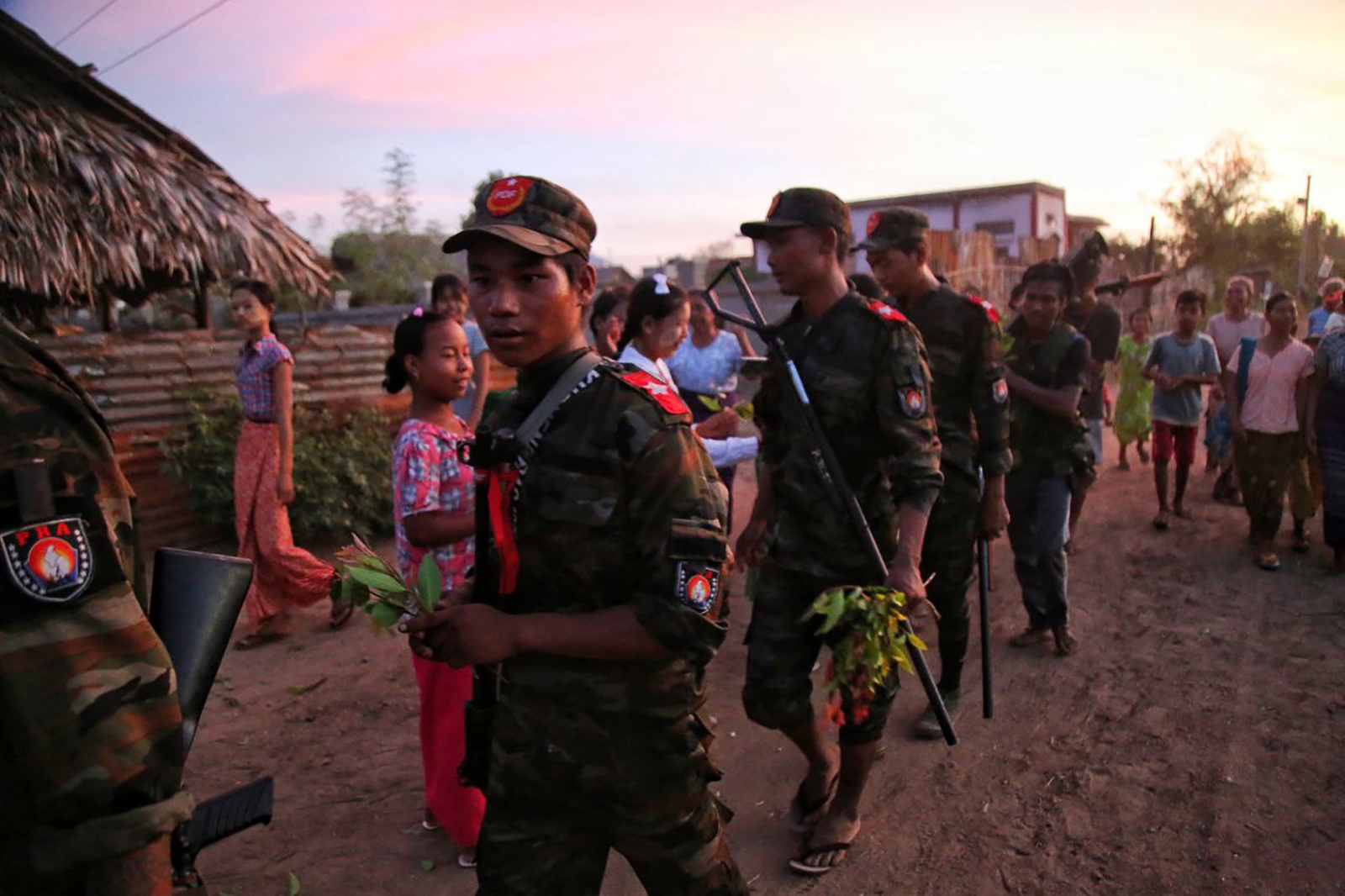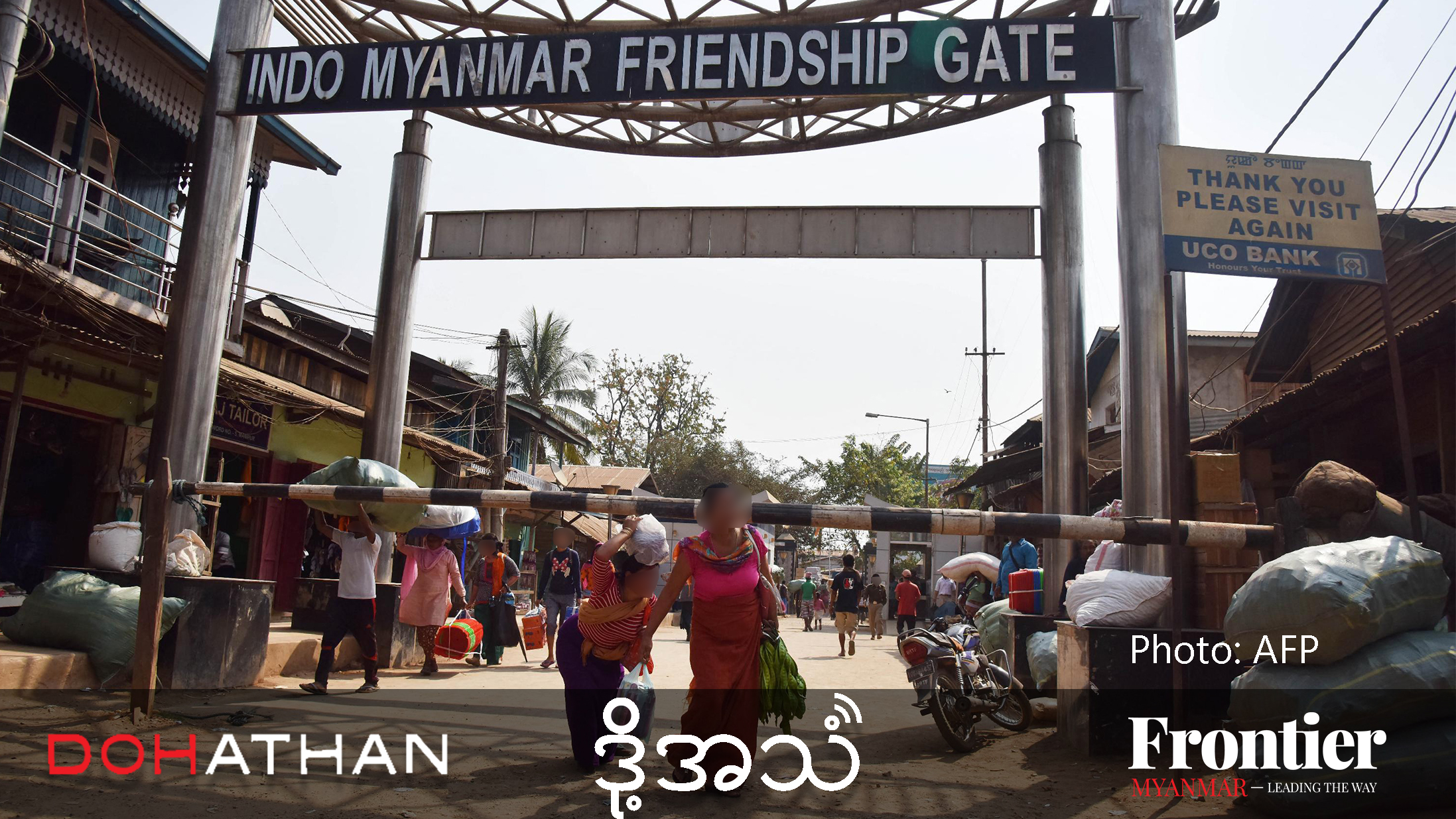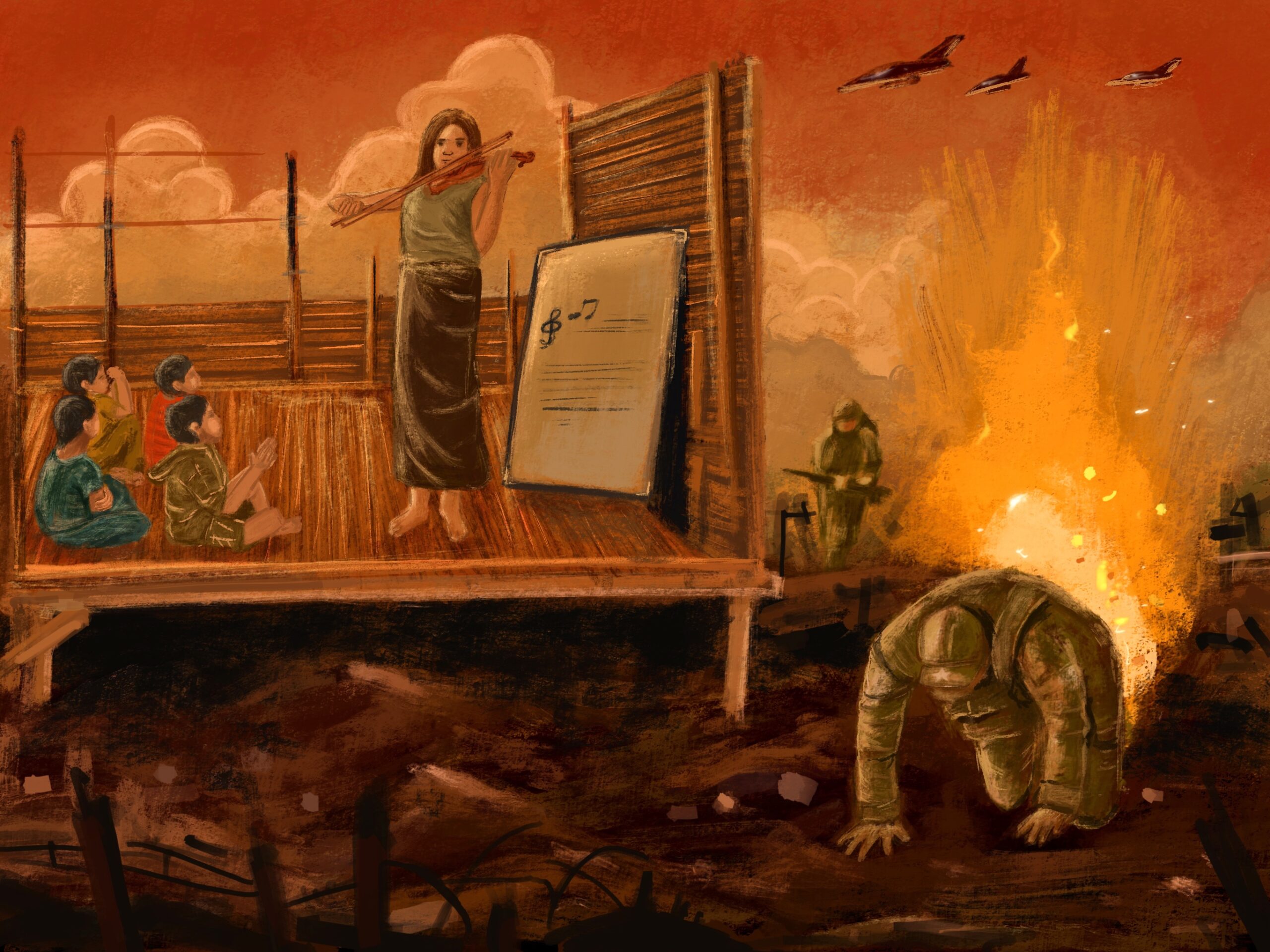As Chin people seek refuge from the Myanmar conflict in the Indian state of Mizoram, a common musical culture with the local Mizo population serves to ease tensions and bring the communities together.
By EMILY FISHBEIN | FRONTIER
On March 3, as the afternoon sun cast a golden glow over the Assam Rifles stadium in Mizoram’s mountainous capital of Aizawl, in northeast India, Benjamin Sum took to the stage. It was Chapchar Kut, Mizoram’s biggest annual festival, and the tall, curly-haired 22-year-old was among the main acts. To the accompaniment of a rock band, he sang laichhuat an chhir, or “stomp the floor”, a classic Mizo song that celebrates a moment of pure enjoyment.
Benjamin Sum, widely popular in Myanmar since finishing second in Myanmar Idol in 2019, has also become one of Mizoram’s hottest stars over the past two years, and the stadium teemed with the energy of thousands of screaming fans.
“In Mizoram, in terms of singing and popularity, I don’t think there are many singers who have that kind of fan base,” explained Jeffrey, a Mizo university student in Aizawl, who compared Benjamin Sum’s popularity to “a K-Pop idol”.
But the performance also carried deeper significance: Benjamin Sum, who is from Sagaing Region’s Kalay Township, is one of some 50,000 people from Myanmar who have taken refuge in Mizoram since the 2021 coup. Like the vast majority of them, he identifies as Chin, part of an ethnolinguistic family spanning northwestern Myanmar, northeastern India and the Chittagong Hills of Bangladesh that also includes the Mizos and Kukis.
Although these communities were separated administratively by British colonial rule, they maintain close social ties that have proven vital during times of crisis. Since the Myanmar coup, India’s central government has maintained diplomatic relations with the junta and in March 2021, ordered its four northeastern border states to stem the “illegal influx” of Myanmar nationals, but Mizoram has instead offered them a safe haven and organised its own humanitarian response.
Similarly, since intercommunal conflict between ethnic Meitis and Kukis erupted in May of this year in neighbouring Manipur State, Mizoram has taken in some 11,000 displaced people, mostly Kukis and Mizos, from its northern neighbour.
In both cases, ethnic kinship has factored strongly into Mizoram’s response, but two and a half years into the Myanmar crisis, funding for humanitarian support remains strained, while tensions tracing back more than two decades have resurfaced. The chaos in Myanmar has caused a resurgence of concerns in Mizoram over smuggling and violent crime. After three Mizos were killed on the Myanmar side of the border in March, allegedly at the hands of rogue ex-members of the Chinland Defense Force-Mindat, enthusiasm for welcoming Chin refugees appeared to be wearing thin.
Less than two months after the Chapchar Kut performance, Benjamin Sum found himself in the middle of this quagmire when the news broke that he had used forged Indian identity documents to register a motorcycle under his name. Suddenly, the singer who had amassed a Mizo fan base and whose music videos racked up millions of views, was the target of intense negative attention, which quickly sparked broader accusations that people from Myanmar were taking advantage of Mizo hospitality.
The controversy quieted down around a week later when Benjamin Sum handed over the forged documents, issued a public apology, and released a song asking listeners if they could “accept me with all my flaws”.
Jeffrey, the Mizo university student, said that although many Mizo people had been upset by the case, he expected that their solidarity with Chin people would endure out of an understanding of the bigger picture. “We want the best for them considering their state and how terrible things are,” he said.
He is one of 12 people interviewed for this report who described the centrality of music to their communities since long before the coup, and the expectation that it could continue to help them get through the challenges they are facing.
“Chin and Mizo people have really loved music since way back, so when we have a problem, music has a huge influence,” said Lalnunsanga of the rock band T. Melody, whose members are from a Mizo enclave in Kalay. “Whether Mizo or Chin songs, we all feel the music together.”
‘How a good relationship was formed’
According to Alfred Sailo, who studies the culture and traditions of the Chin-Kuki-Mizo people, music has been a common thread throughout their history, whether through beating drums and gongs or singing locally-composed hymns after the widespread conversion to Christianity in the early 20th century.
This passion for music is also embedded in modern life. “Music is very much a part and parcel of our culture. We sing when we are happy; we sing when we are sad; we express everything of our emotions through music,” said P.B. Lianthangpuii, a senior public relations officer with the Mizoram State government and a well-known Mizo musician.
This love of music has brought communities together across borders for generations. In the 1970s and 80s, as the Mizo National Front fought for independence, Mizoram’s gospel singers travelled to Yangon to record music, according to Booma Hangsing, a folk-rock musician whose mother, C. Luri, recorded her first songs there.
The first three Mizo rock bands also emerged in Myanmar in the 1970s. “At that time, due to the MNF insurgency period in Mizoram, there was no improvement of music there,” said Mizo rock singer Lalbuta. Hailing from Chin State’s Falam Township, Lalbuta established the Mizo rock band Vulmawi back in 1976 with a group of friends after studying and performing alongside classic Burmese rock musicians in Mandalay.

The same year, the band recorded the first Mizo-language rock album in Mandalay. According to Lalbuta, it was broadcast on All India Radio, while its cassette tapes were released in Mizoram. “That’s how a good relationship was formed” across the border, he said.
In 1986, the Mizo National Front signed a peace accord with India’s central government. Two years later, pro-democracy protests erupted in Myanmar, but were suppressed by violent military crackdowns, driving thousands of people to flee to Mizoram. Over the next decade, they were increasingly accused of bringing crime into the state according to a 2009 Human Rights Watch report. It describes anti-foreigner campaigns in the late 1990s and early 2000s which resulted in the expulsion of thousands of Chin people back to Myanmar.
Against this backdrop, T Melody was invited to Aizawl to sing at Chapchar Kut in 2009, according to Lalnunsanga, in order to cool tensions. “It got to the situation where [some Mizos] were thinking of kicking out all Chin people from Mizoram. To keep that from happening and resolve the problem, influential Mizo people and state government officials said, ‘T Melody, come quickly and sing’,” he recalled.
The band sang Duhaisam, a song written by the Mizo rock band Zo Di in 1975, after it was excluded from a Mizoram State government-organised music contest because its members were from Myanmar. The lyrics describe a love of the homeland that transcends international boundaries, the pain of being rejected as outsiders by one’s own people, and a desire for ethnic unity.
According to P.B. Lianthangpuii, this concert and another in Mizoram’s border town of Zokhawthar in 2014 were among several initiatives to bring the two communities together. “I think music is one big factor which already broke that barrier of looking at each other with a little bit of coldness and reservations,” she said.
The rhythm flows both ways, and Chin people have also long connected with Mizos through music. David Lai, a famous singer-songwriter from Myanmar, said that he was first introduced to Mizo culture by listening to gospel icon Vanlalsailova as a teenager in Yangon. “I didn’t know anything about the brotherhood, history or cultural similarities between Chin State and the other side of the border; the music connected me to that,” he said.
After Chin people began settling in Western countries in large numbers as refugees, they also initiated their own form of musical diplomacy by hosting Mizo singers for live concert tours abroad.
“Mizo singers are very influential, very popular, and very respected… Through the singers, we can outreach to more people,” said Vanceuuk Khenglawt, who is from Thantlang in Chin, but now lives in Indianapolis in the United States. He has helped to bring numerous Mizo singers to the US through the Chin Baptist Convention-USA and ChinTube, a Christian nonprofit.
This tradition has continued after the coup – from April to June of this year, ChinTube and the Chin Baptist Convention-USA hosted prominent Mizo singers for a charity concert tour to support displaced Chin people in Myanmar.
In recent years, Chin singers have also made more effort to reach Mizo audiences, according to Mizo singer and songwriter Lalrinpuia Ralte, who goes by the stage name Rpa Ralte. Around 2019, he began writing Mizo songs for Chin singers, including David Lai, some of which have been viewed more than a million times. ”When we started having hit songs, the Chin community became like one with the Mizo community,” he said.

A shared responsibility
This sense of a shared culture and community helped lay the groundwork for Mizoram’s response to the Myanmar coup. On February 25, 2021, as Myanmar military forces scaled up their lethal crackdowns on pro-democracy protests, Mizo singer Rebecca Saimawii released a cover of the Burmese revolutionary classic kabar ma kyay bu, whose title roughly translates to “we will not forgive until the end of the world”, along with a message of solidarity to her “brothers and sisters of Myanmar”.
Less than a month later, Mizoram hosted its first of many charity concerts, something it has since emulated during the ongoing Manipur crisis. These concerts have raised funds to support displaced people and even Chin resistance groups fighting the junta in Myanmar.
Chin musicians who fled to Mizoram after the coup described being welcomed by Mizo audiences and singers. “Mizo people have written songs for me about the military coup and given me lyrics, and when I sang them, I became very close with some famous musicians,” said P. Thawng Bawi from Hakha, Chin’s capital, who fled to Mizoram in March 2021.
In January last year, he formed the superband Guys From Chin along with David Lai and Benjamin Sum. The band went on to participate in more than 40 online and in-person charity concerts and organised more than a dozen shows in Chin refugee camps.
Another band, Matupians, was established in May last year by six youths from Chin’s Matupi Township. A member who goes by the stage name Cung Cung said the reception has been positive, but his excitement at performing is often overshadowed by worry for his community.
“When we sing, although we enjoy it, we feel sorry at the same time,” he said. “I’m always thinking about whether the people in the forest have enough to eat and how I can support them.”
Singers have also effectively used music to raise broader awareness, including through a cover of Michael Jackson and Lionel Richie’s We are the World, accompanied by an introduction highlighting the plight of Chin people. Released by a group of Chin and Mizo singers this February, it has racked up more than 3 million views and was formally praised by Myanmar’s National Unity Government, the parallel administration appointed by elected parliamentarians ousted in the coup.
Gloria, a young Mizo R&B singer in Aizawl, encouraged Mizo people to “stand in solidarity with the Chin people during this difficult time”, and expressed hope that both Chin and Mizo musicians would use their platforms to promote “dialogue and understanding”.
David Lai recognises the power of his platform, and says it’s also a responsibility that he takes seriously.
“For years, we have been building a relationship and trust. During this era, everyone has a responsibility – whether the Mizo community or Chin community, we all have a responsibility to keep this good relationship and peace,” he said. “As musicians, we are unique in that we are those who have a voice… The way we stand is very important.”







